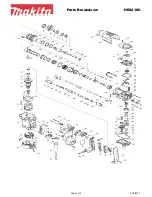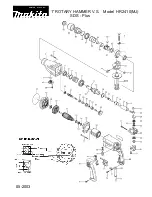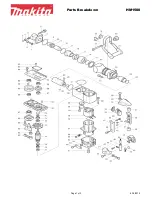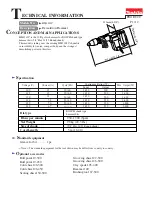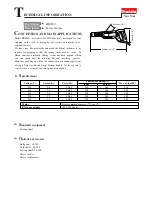
from the valve stem.
NOTE:
It is recommended to use a separate air gauge to double check the actual inflation pressure achieved.
Replace any valve cover previously removed.
8. STORAGE
8.1.
STORAGE
8.1.1.
This unit may be stored in any position. Ensure that the clamps are securely attached to the clamping posts at the rear of the unit.
Store at room temperature. It is recommended to recharge the unit every three months when not in use and more frequently in
warmer or colder storage conditions to keep the battery in peak operating condition.
9. BATTERY REMOVAL/DISPOSAL
NOTE:
The RoadStart battery is a sealed, lead-acid type. At the end of the RoadStart’s service life, by law, it must be removed
and recycled, or disposed of properly, according to national and/or local regulations.
9.1.
REMOVAL
9.1.1.
Place the RoadStart unit front side down.
9.1.2.
Remove the 11 screws holding the casing together and lift off the back half of the unit.
9.1.3.
Undo and remove the nuts, bolts and washers on each battery terminal. The connecting wires will now be loose.
9.1.4.
Move the wires away from the two battery terminals, taking care to avoid accidental arcing of the terminals.
9.1.5.
Lift the battery out of the front half of the casing.
9.2.
DISPOSAL
9.2.1.
Take the battery to a recycling centre that handles sealed, lead-acid batteries.
9.2.2.
If there is no recycling centre in the area, contact the local environmental agency for disposal instructions.
10. TROUBLESHOOTING
QUESTION
ANSWER
How many jump
starts can a fully
charged RoadStart
do before needing to
be recharged?
Between 1 and 20 depending upon
operating factors such as temperature,
general condition of the vehicle, engine type
and size.
Can the RoadStart
be recycled?
Yes, in accordance with national and local
authority regulations.
What is the ideal
in-use storage
temperature
of the RoadStart?
Room temperature. The RoadStart will also
operate at lower temperatures, its power
however will be lessened. Intense heat will
activate self-discharge.
I have a regular 10
amp battery charger,
can I use it to
recharge the
RoadStart?
No. Only the supplied charger can be used.
Is the RoadStart fool
proof?
No. All jump starting instructions must be
followed carefully.
Can I replace the
internal batteries?
Yes, but note that the batteries are not
covered by warranty as they are
consumable items
THE PROBLEM
THE SOLUTION
Unit has been charged
for 36 hours but there
is no change in the
status of the LEDs
Check charger to see that it is charging.
Charger should be warm.
Check all wire connections
Charger works well but
still no change in LED
status.
Possible defective internal battery.
No LEDs come on, but
when the AC adaptor is
plugged into the unit
they do.
Roadstart unit battery defective which
could have been caused by intense use
without a cool-down period.
Roadstart unit is fully
charged but delivers no
power.
Check where the wires meets the jaw on
the unit clamps. Ensure they are well
crimped. Ensure that the safety switch is
in the ON position.
When connecting an
accessory via the dc
outlet there is no
power.
The accessory is drawing too much
current, resulting in the internal circuit
breaker operating. Allow to cool and
reset. Check accessory current draw.
RS131.V3 RS132 | Issue 5(I) 04/01/16
Original Language Version
© Jack Sealey Limited








